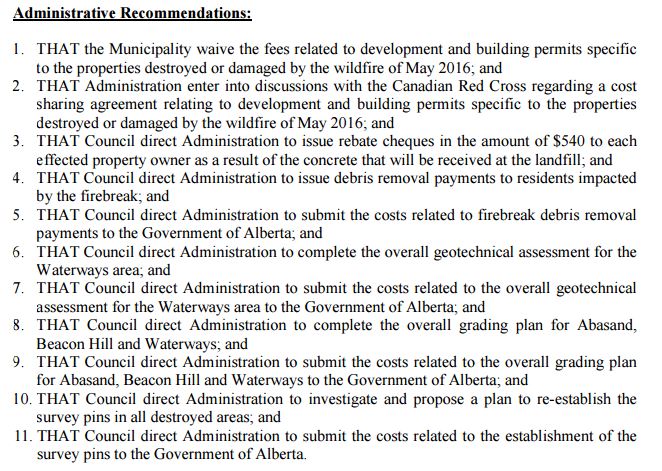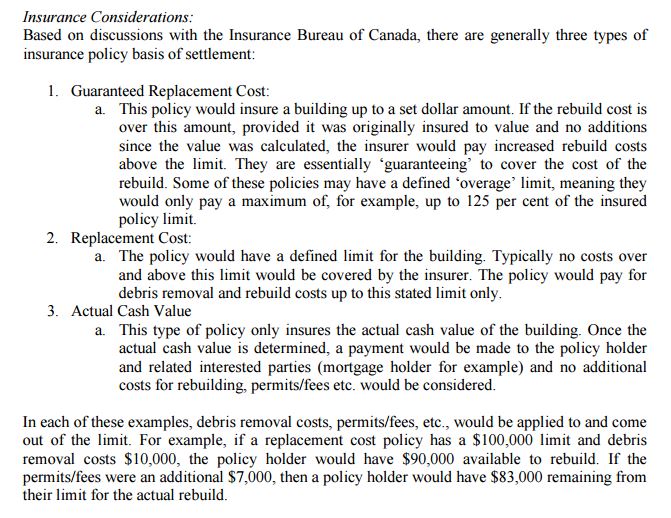Based on staff recommendations and one motion from Councillor Tyran Ault, RMWB council has approved 12 measures to offer varying levels of relief for residents affected by the wildfire that are within the scope and purview of what the municipality can control.
The total cost of providing this relief would be $11,500,000 with some portions of the costs covered through the Disaster Recovery Program, which is funded provincially and federally, and through non-profit collaboration where possible.
The first 11 recommendations came from staff:

The twelfth recommendation came from Ault who spoke in response to questions from delegates about the high cost of tipping fees for commercial waste, on average $85 per tonne, that are being passed on to the homeowner or absorbed by local contractors. Council approved his motion to investigate whether the province will cover the cost of waiving those tipping fees for debris removal as it did in the High River and Calgary Floods and Slave Lake wildfire.
The aim of the move overall is to reduce the burden of rebuilding that is being placed on homeowners who lost their homes or suffered damage to their homes in the wildfire. Executive Director Bob Couture explained in many cases insurance policies offer a set limit of what will be paid for a rebuild and every fee applied is eating away at the total dollar amount available to a homeowner to replace what was lost in the fire.

By reducing or waiving municipal costs where possible, and applying for funding through the Disaster Recovery Program or through non-profits to cover the cost of offering this relief, the municipality is able to take some steps toward limiting the number of people who would be considered underinsured by helping them reserve as much as possible of their insurance payout for the physical rebuild of their home.
Rebuild and development fees
The total cost of waiving the fees for development permits is expected to be roughly $9 million with some portion of that cost shared by the Red Cross. Couture said the RMWB staff have entered talks at this time with the Red Cross for cost-sharing measures which have been met with favourably but said it was too early in those negotiations to provide details as to how much could be covered by the agency.
Some fees are based on a flat rate such as the development permit fee of $75 however, building and building discipline fees are based on square footage, fixtures, etc., that being said, it could be estimated that permits range between $75 to over $7,500 with an expected average of $3,500 per single family house.
Landfill fees
According to the recommendation put forward, Landfill fees and tipping rates are generally developed to recover costs associated with future capital construction, in-situ treatment, monitoring, materials and labour. Right now, the average tipping rates are about $85 per tonne, but it costs the Municipality approximately $120 per tonne to actually handle the waste that is being brought in.
That means already the RMWB is subsidizing all users of the landfill by about 30 per cent.
In addition to that ongoing subsidization, the RMWB has waived the cost of all residential household waste throughout the municipality until October 31, 2016 and the landfill is operating 24 hours per day instead of 10 hours per day. That costs an additional $414,420 to subsidize the tipping fees while costing the RMWB an additional $433,000 per month to operate the landfill for 24 hours per day.
Ault’s motion will still look at providing landfill services free of charge to homeowners doing debris removal but only if the cost will be covered by the province.
Concrete rebate
Couture said the wildfire has presented a unique opportunity for the municipality because the landfill is receiving the concrete from the damaged and destroyed properties, which the RMWB is able to process and use for future road building or other future infrastructure projects.
As the landfill fees are already subsidized by approximately 30 per cent, staff proposing a rebate program direct to the resident in response to the benefit of the concrete, which was approved alongside the other measures by members of council.
Every household that sends concrete from a home or foundation damaged in the fire or because of the fire break will receive a cheque for $540. It will be sent to the registered homeowner of the property.
The rebate was estimated based on the face the average house will produce approximately 90 tonnes of concrete and the RMWB could save $6 per tonne by reusing this concrete because, typically, the Municipality would have to purchase crushed aggregate for infrastructure projects.
The total cost of the rebate will be $1,392,660.
Firebreak home fees
Council also approved relief for homes damaged in the creation of a firebreak.
To date, 53 properties have sustained damage due to firebreak activities, specifically from bulldozing rather than properties that sustained damage due to the wildfire.
Firebreak damages identified to date include: eight homes with garages, eight homes, 17 garages, one condominium unit, three fences, five decks and damage to 11 yards.
Couture said these homeowners likely have excess costs due to the cost of the landfill, higher demolition costs to remove the debris and many were not able to participate in the sifting or heirloom retrieval program as in some instances all of the debris was pushed into one location.
The compensation approved for these residents will be an up-front measure to cover costs incurred by the residents while a comprehensive program is developed that may add to their compensation over the longer term. Already council had agreed the homeowners who suffered loss and damages in the creation of the firebreak are owed a debt of gratitude from the community because the break directly resulted in stopping the spread of the beast into dense areas of the community.
Based on the average costs of demolition, compensation will be as follows:
- home and garage $15,000
- home only $12,000
- garage only $3,000
- fence $750
- deck $500
These upfront costs will not deduct from any future program that is developed.
Based on the calculation for all of the firebreak damages, the total upfront cost is $292,500.
It is anticipated that once a full compensation program is communicated, there may be additional individuals who identify themselves as having sustained firebreak damage, which will be reviewed and confirmed by the RMWB.
Council also approved directing Administration to submit the costs related to firebreak debris removal payments to the Government of Alberta for reimbursement under the Disaster Recovery Program.
Geotechnical Reports in Waterways
An overall geotechnical report will be done for the community of Waterways to cover the areas where there are significant slopes because all developments near slopes require a geotechnical report for the lot be submitted at the time of a development permit application.
Completing a full report for the community may not replace the need for individual house geotechnical reports, however, it will help the RMWB figure out whether there are certain areas fit to rebuild on.
Current estimates for this overall geotechnical report in Waterways are $200,000. The RFP for this work has been posted publically on Alberta Purchasing Connection. This would also be submitted for coverage through the Disaster Recovery Plan.
Overall grading plan
In the interest of treating the rebuild as an entire subdivision rebuild in Abasand, Beacon Hill, and Waterways, as well as fitting the overall interest of providing some relief for costs for residents, council approved the staff recommendation for completing an overall grading plan for the three communities.
At the time of subdivision the overall grade and the grades for each lot are set. This information is used by the surveyor to create individual site plans for each lot at the time of development. Upon submission of the development permit, Administration confirms that the grades proposed on the site plan reflect the overall subdivision design.
Current cost estimates for this work vary between $25,000 and $100,000 per area depending on the amount of work required. The total amount being set aside is $300,000 to cover the worst-case scenario.
Survey Pins
During the demolition period many of the survey pins were destroyed as a direct result of demolition. As such, the Municipality will investigate and propose actions required to reestablish the survey pins in all areas to reduce that overall cost to the homeowner at the time of their survey.
The cost would be submitted to the Government of Alberta for reimbursement through the Disaster Recovery Program.
Site Plan, Real Property Report and As-Built Grading Certificate
When homeowners apply for a development permit, they have to submit a site plan that references the proposed home on the lot, including the proposed grades for the home and any easements. As a condition of the development permit, a Real Property Report (RPR) and As-Built Grading Certificate are to be submitted following construction.
As these three documents are so specific to each lot and would be covered through insurance, the Municipality proposes that these costs remain the responsibility of the homeowner. It is estimated that these costs could be approximately $4,300 for each property.
For those residents who are uninsured or underinsured they would be able to reach out to the Canadian Red Cross about their specific requirements.
Should Council wish to cover the costs, given these three documents are specific to each lot and homeowner, the homeowner would be required to do the work and provide an invoice and receipts to the Municipality.
The estimated cost for these three documents would be approximately $7,000,000 but staff did not include the cost of administrating this program in its estimate.
To read more click item #4 on Tuesday’s agenda and open the related documents on the right-hand side.
If you have questions about how these relief measures will affect you, call the PULSE Line at 780-743-7000 or email recovery@rmwb.ca.







